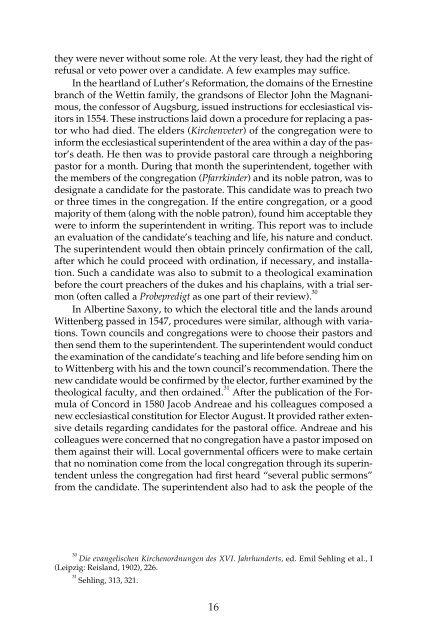45930 Divine Call CTCR final - The Lutheran Church—Missouri Synod
45930 Divine Call CTCR final - The Lutheran Church—Missouri Synod
45930 Divine Call CTCR final - The Lutheran Church—Missouri Synod
You also want an ePaper? Increase the reach of your titles
YUMPU automatically turns print PDFs into web optimized ePapers that Google loves.
they were never without some role. At the very least, they had the right of<br />
refusal or veto power over a candidate. A few examples may suffice.<br />
In the heartland of Luther’s Reformation, the domains of the Ernestine<br />
branch of the Wettin family, the grandsons of Elector John the Magnanimous,<br />
the confessor of Augsburg, issued instructions for ecclesiastical visitors<br />
in 1554. <strong>The</strong>se instructions laid down a procedure for replacing a pastor<br />
who had died. <strong>The</strong> elders (Kirchenveter) of the congregation were to<br />
inform the ecclesiastical superintendent of the area within a day of the pastor’s<br />
death. He then was to provide pastoral care through a neighboring<br />
pastor for a month. During that month the superintendent, together with<br />
the members of the congregation (Pfarrkinder) and its noble patron, was to<br />
designate a candidate for the pastorate. This candidate was to preach two<br />
or three times in the congregation. If the entire congregation, or a good<br />
majority of them (along with the noble patron), found him acceptable they<br />
were to inform the superintendent in writing. This report was to include<br />
an evaluation of the candidate’s teaching and life, his nature and conduct.<br />
<strong>The</strong> superintendent would then obtain princely confirmation of the call,<br />
after which he could proceed with ordination, if necessary, and installation.<br />
Such a candidate was also to submit to a theological examination<br />
before the court preachers of the dukes and his chaplains, with a trial sermon<br />
(often called a Probepredigt as one part of their review). 30<br />
In Albertine Saxony, to which the electoral title and the lands around<br />
Wittenberg passed in 1547, procedures were similar, although with variations.<br />
Town councils and congregations were to choose their pastors and<br />
then send them to the superintendent. <strong>The</strong> superintendent would conduct<br />
the examination of the candidate’s teaching and life before sending him on<br />
to Wittenberg with his and the town council’s recommendation. <strong>The</strong>re the<br />
new candidate would be confirmed by the elector, further examined by the<br />
theological faculty, and then ordained. 31 After the publication of the Formula<br />
of Concord in 1580 Jacob Andreae and his colleagues composed a<br />
new ecclesiastical constitution for Elector August. It provided rather extensive<br />
details regarding candidates for the pastoral office. Andreae and his<br />
colleagues were concerned that no congregation have a pastor imposed on<br />
them against their will. Local governmental officers were to make certain<br />
that no nomination come from the local congregation through its superintendent<br />
unless the congregation had first heard “several public sermons”<br />
from the candidate. <strong>The</strong> superintendent also had to ask the people of the<br />
30<br />
Die evangelischen Kirchenordnungen des XVI. Jahrhunderts, ed. Emil Sehling et al., I<br />
(Leipzig: Reisland, 1902), 226.<br />
31<br />
Sehling, 313, 321.<br />
16


